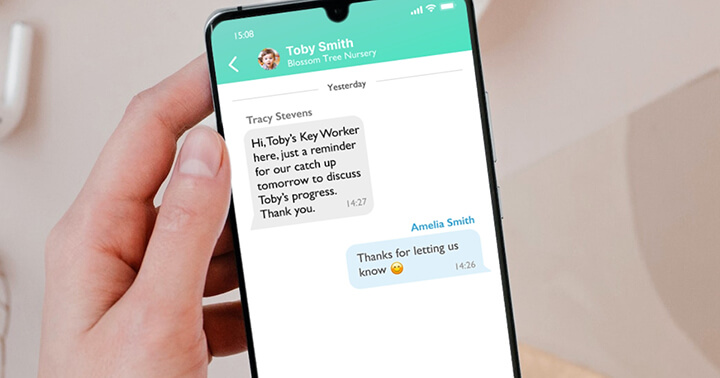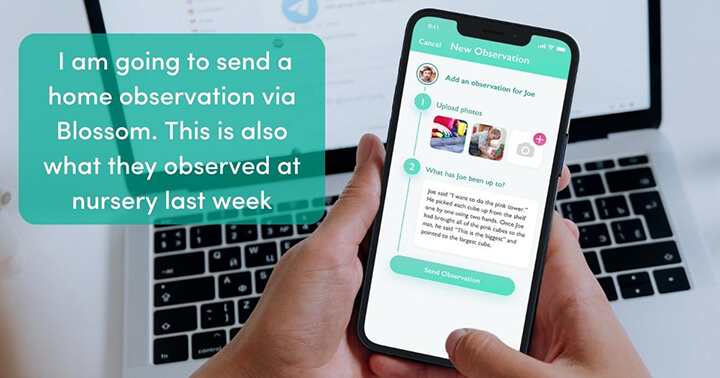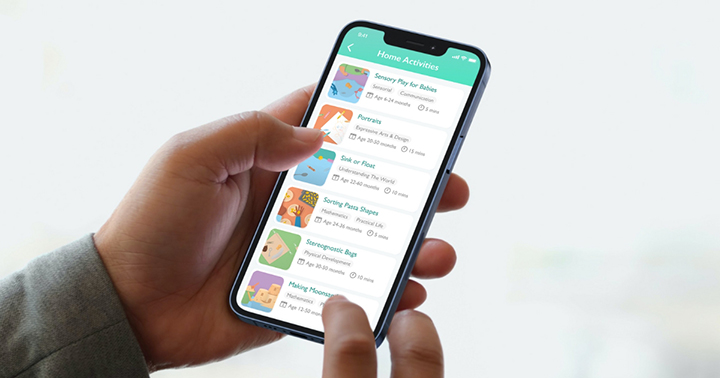The Leuven Scale is a valuable tool used in early years to help practitioners assess and monitor development and behaviour levels in preschool. Early years practitioners may be familiar with using the scales for assessments, but parents can be unsure about terminology, the reasons behind and how to use the scales to boost child development and outcomes. We share all you need to know about this assessment tool and how to explain them to your nursery parents.
What are the Leuven Scales in EYFS?
The scales are an assessment tool created by a team of researchers from the Center for Developmental Psychology at KU Leuven in Belgium. They were created to be used by early years practitioners to measure the social-emotional development and behaviour of young children who are preschool age.
There are 4 well-known Leuven Scales, they measure well-being and involvement, engagement, relationship, and classroom behaviour. The most commonly used scale for nurseries is the scale that measures well-being and involvement. The scales are used by practitioners to flag any potential special needs concerns that may benefit from early behaviour intervention.
Why do Early Years practitioners use the Leuven Scales?
Early years practitioners use the scales for a variety of reasons. They are a universally used and measurable tool underpinned by research and an evidence-based approach. Personal, emotional and social development is one of the three prime areas of learning for EYFS. Learning to work with others through play-based activities helps children to build vital social skills.
This assessment tool can help to pinpoint strengths and areas for development with social skills, emotional regulation and the ability to follow instructions. They are often used as an initial conversation with parents about the need for communication and language development in the nursery. This assessment tool was designed to be flexible and adaptable to support children with Special Educational Needs and Disabilities (SEND). A wide variety of early years settings use the scales to measure social-emotional progress, including: childminders, private day nurseries and centres.
What are the benefits of using the Leuven Scales in EYFS?
By identifying social-emotional behavioural needs early on, interventions can be organised by key workers and nursery staff to narrow the gap of understanding between the child and their peers. The scales are designed to have measurable data, and so can give practitioners, who may not specialise in SEND or communication and language, confidence.
Each assessment is delivered independently. Each child is observed across several socially demanding situations throughout the nursery day and their data is used to formulate any necessary interventions. Parents can feel reassured that their child’s assessments are taken by known nursery staff and their results are not generalised across several children.
Measuring social skills can be a challenge for practitioners, as something so subjective as interaction can be difficult to measure. The scales offer the opportunity to gather baseline assessment data surrounding social-emotional development and give the chance to re-evaluate their development regularly.
The transition to big school from nursery can be daunting, especially for those who find social interaction challenging. Handovers between nursery and primary school for those who may struggle to settle can be made easier when baseline scale scores and most recent data are shared with their new teacher.
What to tell parents about the Leuven Scales?
It is important to not overwhelm nursery parents with technical lingo that is used when using the Leuven Scales. It can be easy to forget that you and your early years team regularly use abbreviations and technical terms when talking about pupil assessments (like GLD). Consider sharing information via your nursery software to enlighten parents about the scales and why you use them in your nursery.
Parents can find discussions about potential interventions or SEND assessments daunting. Discuss with your nursery team the agreed language that will be used when explaining the scales and their purpose. If the subject moves towards the topic of SEND identification, be aware this can be a highly emotive topic and parents may need black-and-white, clear information.
Sharing a nursery newsletter detailing the importance of using the scales in your EYFS setting can be an excellent way to justify early assessments. Nursery is a time for development. Social development is crucial for healthy friendships, self-confidence and managed risk-taking behaviour. Early intervention for children with areas of weakness in social skills or emotional regulation can bridge the gap at a young age.
Following up with progress is important for parental confidence and building positive parental communication. Use your nursery software to message parents directly to organise follow-up meetings to discuss the progress of social-emotional interventions.

Some phrases to avoid during discussions with parents during social-emotional interventions:
- Passive attitude 🡪 Rather say: “isn’t gripped by the activity.”
- Daydreaming 🡪 Rather say: “concentration seems elsewhere.”
- Aimless actions 🡪 Rather say: “actions don’t fit the activity.”
How to use the Leuven Scales effectively in EYFS
Regular CPD training on the Leuven Scales, how to use them and a consistent nursery-wide approach is useful for early years staff. The use of the scales for assessment can follow the SEND process of the graduated approach when collecting and processing the assessment data. It is important to follow simple, yet thought-out steps to use the scales effectively.
Step one- learn about the scales
Familiarise your team with the scales, the research behind their creation, and their aims. If your staff are confused with the purpose and focus they are looking at during the observations, it will make the assessment ineffective. Consider analysing how much of the scales your nursery team confidently understands, as this might propose an avenue for CPD. If you have a high turnover of staff or have a number of apprentices in your team, you may want to add training for this specific assessment tool when you create a bespoke CPD plan for your setting.
Step two- prepare for the observations
Preparation for the observations needed to collect data is essential to manage your nursery team’s time effectively. Blossom’s occupancy planner allows you to know how many children will be in each nursery room at one time. Helping to plan the best days to collect the observation data for the scales.
Your staff will be busy observing each child and may not be able to be included in the ratio for the room. By using Blossom’s staff planner, your rooms will always be able to meet statutory ratio requirements as you can see who is on duty, when and if more staff are needed.
Step three- undertake the observations
Observe the child across several social situations: meal time, unstructured playtime, structured playtime, sensory play activities and activities of interest. Gathering data for the Leuven Scales across various activities can help build a bigger picture. Although home observations won’t be included in the data collected, it can be useful to use home observations that are added by parents on their Blossom App to confirm the behaviours you witness in the nursery.

Step four- score the findings
The scoring system used for the scales is helpful in giving examples of the types of social-emotional behaviour you are looking out for when assessing the child. It can be useful to discuss with your team the example behaviours for each level. Consistency and clarity will improve the effectiveness of the assessment.
Your setting can differentiate the assessments for children with SEND easily when it comes to this specific assessment tool. Think carefully about the staff who will undertake the observations; known key workers are the best suited for this for familiarity. Adjust the length of time, time of day and social situation you observe the children in to meet their needs. If the child is involved with other external professional services such as Speech and Language Therapy (SaLT), include these professionals in the process where possible.
It also may be beneficial to reduce the length of time between monitoring opportunities for children with Social Emotional Mental Health (SEMH) needs. Here is an example of some of the behaviours that may be used when assessing a child’s engagement levels:
- Level 1: Little to no interest in activity
- Level 2: Easily distracted from the activity
- Level 3: Child superficially engages with activity
- Level 4: Child shows levels of motivation and is concentrating on activity
- Level 5: Child is highly motivated and interested in the activity
Step five- review the information
Once the social-emotional observations have been completed, reviewing the data and looking for trends is important. Your team will look for areas of strength and development for each child to help with the next stage, planning. Parents can be included at this stage to formulate ideas for home support. It is recommended that plans are discussed as a nursery team before contacting parents to give confidence in the next steps and measurable targets.
Step six- create a social-emotional development plan
Your nursery team will benefit from discussing the scores collected when using the scales and can formulate next steps and plans together. This is the perfect opportunity to build mentoring and coaching partnerships across your nursery. Pair an experienced staff member with an apprentice or recently qualified early years practitioner to discuss the results of the assessment.
This collaboration within your team will also be useful when planning EYFS activities to build social skills, emotional regulation opportunities, instruction following, and how to build mentally healthy habits in the early years. Parents can be informed of extra activities to try at home for building social skills and instruction following. Sharing easy activities for communication and language via your newsletter or via the home activities feature on Blossom can be a good way to share ideas with parents.

Step seven- monitor progress regularly
Monitoring the child’s social-emotional progress is the final stage of undertaking the Leuven Scale assessment with EYFS children. The process must be flexible and reactive to the child’s needs in order to be effective. Meaning, the monitoring stage of the assessment will lead into more discussions and planning of activities to lessen the gap of social-emotional development between the child and their peers.
Subscribe to receive expert advice and tips from seasoned professionals in the early years sector.